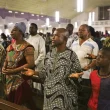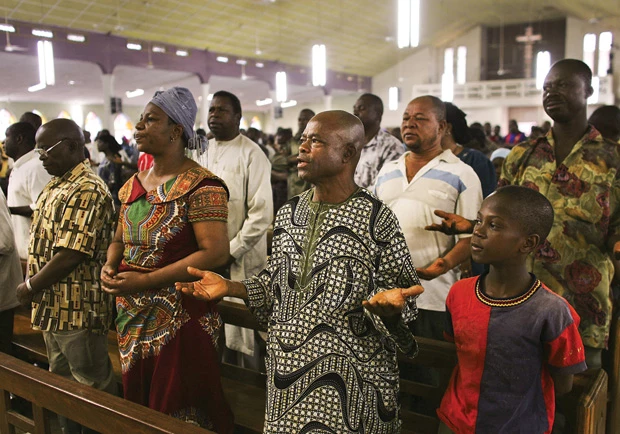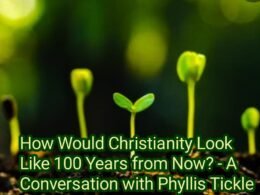Pentecostalism in Nigeria has witnessed three distinct waves or stages of evolution in the last hundred years or so. The first wave emphasized divine healing, prophetic revelations, and fervency in prayer. It was championed by the African Independent Churches or African Initiated Churches (AICs) known as the “Aladura movement”—representative of a praying group of people who have adopted prayer as a lifestyle.
The second wave between 1952-1954 related to the activities of the Latter Rain Revivals in the Southwestern part of Nigeria. The third wave centered around the evangelistic mission of the renowned American Evangelist, Billy Graham, who perhaps, was the first to visit the country with a unique evangelistic concept in 1960. This transformed the way crusades were conducted in Nigeria from that time onward by other evangelists.
Contemporary Pentecostalism in Nigeria is arguably the direct and the combined product of the second and the third wave, which reached its climax in the 1970s. Pentecostalism has been growing phenomenally in Nigeria since the time of the third wave, arising from the eruption of great revivals all across the university campuses within the nation. These revivals provided a channel for the influx of American Pentecostal reading materials which shaped and provided a new evangelistic perspective amongst Nigerian college students.
A notable influence on these college-aged youths was Pastor Elton, a British Missionary of the Apostolic Church. He helped nurture Pentecostalism as a movement in Nigeria through his missionary activities, which caused substantial growth of the movement. On several occasions, some Nigerian undergraduates, in their quest for more knowledge about the baptism of the Holy Spirit, visited his base in Ilesha to acquire ‘spiritual understanding .’ Pastor Elton’s publication, “Herald of the Last Days,” was used to emphasize the Pentecostal revival, spiritual warfare, and the Prophetic role of Nigerian youths in the spread of the gospel across Africa and the world at large. Furthermore, the publication promoted Pentecostal doctrines and provided the emerging needs that aided the charismatic movement in those formative years.
My essay identifies some socio-political implications of Pentecostalism and its impact on nation-building, particularly in the southwestern part of Nigeria. Some incredible achievements have been made by the Pentecostals, which is impacting the nation’s overall well-being, thereby contributing immeasurably to societal values. These remarkable achievements can be traced to the unique principles and doctrines that address the citizens’ fundamental issues, such as poverty, unemployment, lack of education, inadequate health care, and other social needs. As rightly observed by Gaiya, “Pentecostalism in Nigeria is shifting from strictly spiritual solutions to sociopolitical problems, to an emphasis on meeting social needs in practical ways.”
The systematic shift of Pentecostalism from strictly spiritual matters to other mundane issues of life is easily understandable when one considers that the government of Nigeria has failed woefully in issues regarding the advancement of its people. The government, since independence in 1960, has disappointed its people. To date, basic social infrastructures such as good schools, road networks, health care, uninterrupted electricity supply, which ensure the success of any nation, are nearly non-existent. This is even worse now that the country is technically in recession. The government’s policies do not have a far-reaching effect on the masses, which means businesses are now folding up, resulting in an astronomical unemployment rate with well over seventy percent of the population living below the poverty level.
Supposedly, Nigeria is a secular state, but churches, especially the Pentecostals, have swung into action with desperation to build up the old ruins and the desolate places due to the government’s constant failure. For the most part, the Pentecostal leaders are motivated by the desire for a changed state. They are massively reorienting their ever-expanding followers, now perhaps the largest in the country, to actively get involved in the socio-political terrain and create the needed change. They now emphasize their salvific role as Christians as a precursor to nation-building and are increasingly less comfortable sitting on the fence regarding national development. Whether this stance among the Pentecostals will yield the right result is a matter for discussion in nearest future.
To demonstrate their seriousness in issues regarding nation-building as frequently proclaimed on their pulpits, a very popular Lagos-based preacher, Pastor Tunde Bakare, ran with the incumbent President as his running mate in the 2011 elections they lost. The incumbent President ran for the top elected office again in 2015, and as before, he chose another pastor from the largest Pentecostal denomination in the country – Pastor Yemi Osibajo. This time, they won. The two of them have now won two terms of their presidency which will end in 2023. The clear signal is that the citizenry is craving change and hoping that succor will emerge from the charismatic circle since the ruling class has failed them in previous years.
As I have already pointed out, Nigeria is a secular state. Still, the nation’s people are greatly disappointed because the ruling class is only motivated by selfish interests and gains, not willing to be held accountable for their misconducts and excesses at the expense of the people. Since independence, the country’s state can best be described as comatose, with the total abandonment of governmental responsibilities. This, without doubt, is putting a great sense of responsibility upon the Pentecostals with a determination to make a positive impact.
The Pentecostal churches of today are utilizing doctrinal principles as a tool to reorient their members in the sense that it addresses the practical aspect of their lives for a productive end. Therefore, with these principles, they are now taking ownership of specific institutional structures that have been long abandoned by the government, encouraging their followers to put in their best efforts and make such institutions functional again for societal benefits.
Since the incursion of Christianity in Nigeria, there has been a symbiotic relationship between religion and development as understood in the “Western” context. This was truly evident during the colonial era when religious institutions worked side-by-side with the colonial authority to bring about needed development. Although most modern societies have sought to build secular societies without the intervention of religion, such aspiration has been a total failure in the Nigerian context. Current events in Nigeria have increasingly made the idea of a secular state unattainable despite the hopes and aspirations of an ideal society that it promises. A secular state is faulty in its fundamental principles because it wants to abolish religion from directly influencing the socio-political life of a nation. Nigeria as a secular state has proven unattainable due to the abysmal failure of the government to awaken to its social responsibilities. Another reason is the exponential growth of charismatic spirituality that is yet to be aligned appropriately with the socio-political life of the nation. Because of governmental failings and the consequent discontent of the nation’s youths that culminated in the “soro-soke” mantra of police brutality in October 2020, the Pentecostals are determined to rise to the occasion more than ever before. They are now riding on this extraordinary situation to perhaps restore hope to the teeming youths most affected by the government’s irresponsibility. The Pentecostals have thus emerged to give a new life to the abandoned basic infrastructures of the society.
As much as the Pentecostals take gallant steps towards national development, they do not have a smooth ride yet. They have the Islamic fundamentalists, particularly Boko-Haram, to contend with—forces in opposition to western civilization. The Boko-Haram terrorist group has unleashed several attacks on some of these major Pentecostal churches across the nation, killing some of their members in the process. There is a relatively peaceful co-existence between Christians and Muslims in the southwestern region where this essay focuses. Since 1999 two Muslims have served in Lagos State as its governor until recently when the two most recent governors are members of the Christian organization. One of the two is a member of the largest Christian organization. During the two-term tenures of the former Muslim governors, they always invited the General Overseer of the largest Christian organization in the country to a yearly State House Thanksgiving Service, the practice that is still in force to date. This symbiotic relationship between the Christians and the Muslims in the region is a welcome phenomenon. Along the Lagos-Ibadan expressway, where many of the most prominent Pentecostals headquarters are now situated, there is also the presence of activities of the big and strong Islamic group (NAFSAT) with their massive worship ground in the exact geographical location of the Pentecostal churches. This inter-religious affair has not caused any major upset in this region for many years, as religious intolerance is commonly reported in the Northern part of Nigeria.
In conclusion, Pentecostalism has achieved some remarkable feats in influencing societal values while also shaping the national, political, and socio-economic landscape in Nigeria. However, the essay only focuses on the southwestern part of Nigeria, where most of the churches of the Pentecostal headquarters are located with some allied institutions, including universities, banks, and healthcare centers. While one may want to applaud these laudable attainments by these churches, l also think that their real motives should not be allowed to fester without being queried. Apart from stated reasons, their real intents may, at the end of the day, have far-reaching socio-political implications, whether positive or negative, on the country. Their overall interest, without a doubt, needs to be verified as against motives that are selfishly informed.










